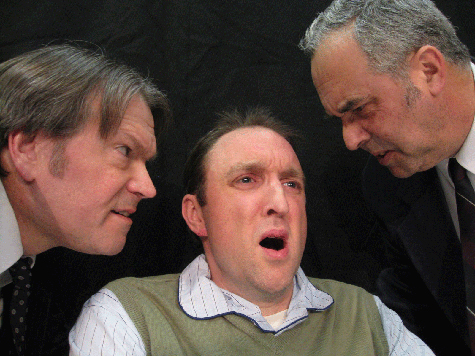
UNDER PRESSURE Absurdist questions mimic modernity’s stresses. |
Almost everything goes unsaid in Harold Pinter's 1958 classic, The Birthday Party. Among the unknowns are why, precisely, two men have come looking for Stanley (Joshua Brassard) at a seaside boarding house, what Stanley has done to displease them, and whether or not today is, in fact, his birthday. Knowing any of these facts is beside the point: Pinter's true concern in The Birthday Party is not its plot points, but rather the nature, gesture, and inflection of menace itself. His absurdist masterpiece, both comic and terrifying, is on stage now in a superb, unnerving, not-to-be-missed production of the Acorn Studio Series, under the direction of Michael Howard.
What we do know is that morose young Stanley has been staying for about a year as the only guest at the boarding house of an older couple, Petey and Meg (Jeffrey Roberts and Elizabeth Guest, both excellent in their guileless simplicity). The laconic Stanley has little patience for Meg's vapid breakfast pleasantries, but his disdain turns to horror when he learns that two men will soon be joining him as guests. Sure enough, as soon as they arrive, in sharp charcoal suits and with disarmingly steady gazes, the mystery men — Goldberg (Harlan Baker) and McCann (Joe Quinn) — begin their tortuously ambiguous, deeply jarring campaign of domestic terrorism.
The setting of Stanley's distress is the boarding house's comfortably mawkish sitting room, nicely evocative of rural '50s England with age-grimed periwinkle wallpaper and shelves of kitsch (Stacey Koloski's design), and the studio space itself is profoundly transformed: the stage is now at center, with seats on either side — the left rows on risers and a single opposite row at stage level, only a foot or two from the sitting room table. This configuration, very brightly lit, dramatically heightens the show's intimacy and tension by invoking the primal fear of, among other things, being stared at.
Staring is among the simplest but most disarming of Goldberg and McCann's methods, along with prolonged stillness and sudden movements, and Baker and Quinn are in top form with their casual, deliberate physical menace, bracingly blocked by Howard. Goldberg, the boss of the two, speaks anything but to the purpose, and his rambling, arch-magnanimous memories of his Uncle Barney and gefilte fish are all the more intimidating for being so cryptic. Baker is perfectly cast to deliver these decadent, faux-affable monologues, and Quinn's gaze has never been stonier or emptier. Perhaps the most harrowing scene, built to excruciating fever pitch by Baker and Quinn, comes when Goldberg and McCann join forces over Stanley's chair to barrage him with lunatic questions — When Stanley took fruit salts, did they fizz or not? Is the number 846 necessary or possible? This fragmented sense of threat is breathtaking in the truest sense, far scarier than if Goldberg and McCann were just promising to slice Stanley up.
Domestic life in the boarding house continues to deteriorate eerily into whiskey, children's games, casual lust with the bright-eyed, wide-mouthed Lulu (Kat Moraros, who trills with sensual suggestion), and increasingly consuming bouts of nostalgia. In fact, throughout the play, it's when characters move into memory monologues that we hear the most coherent and detailed narratives — of grandfathers, lost loves, a concert Stanley claims to have played — even if these memories later mutate or prove to be false. The present, by comparison, manifests itself in senseless, broken pieces.